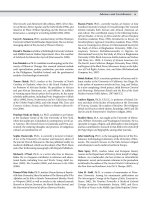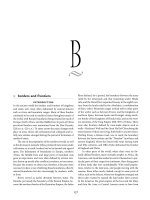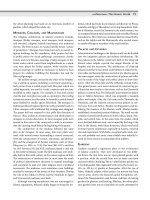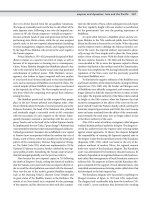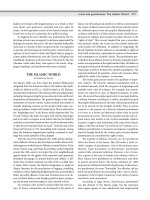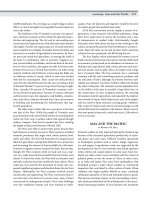Encyclopedia of society and culture in the medieval world (4 volume set) ( facts on file library of world history ) ( PDFDrive ) 769
Bạn đang xem bản rút gọn của tài liệu. Xem và tải ngay bản đầy đủ của tài liệu tại đây (68.17 KB, 1 trang )
742 money and coinage: primary source documents
Europe
• “The Value of Foreign Coin in England” (1266) •
Kinds of silver, namely: of Montpellier which is so
good that an examined pound failed of full measure
by one penny or two at most. The same for the silver
of Eregha. The silver of Fugacio from which place
the pound failed by four pence at most. The silver of
Vrucela and of Flanders whence the pound failed by
four pence. Silver of Verona; the pound usually lacked
twelve pence. The silver of Valencia failed by eight
pence; silver of Pampeluna, the pound lacked two
pence. And all these things have been decided on the
scales.
Concerning the denarii of Venice: a pound was under
weight only by one penny. The same for the money of
Genoa. Likewise those of Montpellier of Spain. The
legal money of Cologne: a pound lacked six pence. The
false money of Cologne: whence a pound failed by three
shillings. The Brussels pound is commonly short three
shillings. The Marseilles pound lacks six pence. But in
Europe
these things the money-changer is watchful so that he
may buy a pound of whatever silver he pleases according
to what returns a better profit to himself rather than to
what will redound to the profit of the king, wherefore
the latter receives a fixed payment of ten pounds.
Wherefore, whether the money-changer is industrious
or not the profit and not the loss will be the king’s. But
the king will not suffer from lack of diligence. Moreover,
from silver vessels the money-changer receives thirteen
pence for each pound; and similarly from gold vessels.
And if these vessels are intact and exposed for sale,
what can be sold for profit over and above the weight
ought to be sold. And likewise concerning the profit on
gold vessels when a gold cup is sometimes worth more
than its weight by twenty shillings, or one mark, or ten
shillings.
From: Hubert Hall, ed., The Red Book of
the Exchequer (London: HMSO, 1896).
• Charles the Bald: Excerpt from
the Edict of Pistes (864) •
C.8. It is ordered that denarii of all kinds, of proper
weight and full content, just as is contained in the
capitularies of our predecessors and royal progenitors,
in the fourth book, the thirty-second capitulary, should
not be rejected until Martinmas . . . nor should good
denarii be rejected, but they should not be accepted
unless properly and well weighed. . . .
C.12. Following the custom of our predecessors, just
as it is found in their capitularies, we decree that in no
other place in all our kingdom shall money be made
except in our palace, and in St. Josse and Rouen, which
right in the past belonged to St. Josse, and in Rheims,
Sens, Paris, Orleans, Chalon-sur-Saone, Melle, and
Narbonne.
C.10. And from the time of the feast of St. Martin
throughout our whole realm, no denarii, except those of
our new mintage should be accepted. And from that day
any one who produces another denarius for a business
transaction should be deprived of it by the count or
other official, just as is contained in the second book of
capitularies, in the eighteenth chapter.
C.13. And those who have control of the money, with
no desire for favor or gain, should select faithful
coiners, as if they were seeking our favor and the grace
of God. And the coiners should themselves take oaths
that they will perform their office faithfully, as well as
they know how. And they should not coin a denarius of
mixed metal nor one of light weight, nor should they
consent to such a thing. And, without any deception
or evil disposition towards those whose silver they
accept for purifying, they should cleanse the silver,
and without practicing any deception in weighing it,
they should change the purified silver into denarii. If
C.11. And on the denarius of our new money there
should be on the one side our name in a circle and the
monogram of our name in the center, and on the other
side the name of the state and a cross in the center.

